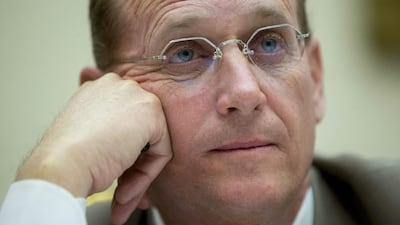Airline rivalry has traditionally been healthy, with rivals competing to achieve better performance, and for the most part doing so in an honourable and dignified manner. And because of that, we as consumers have benefited from great improvements and innovation in air travel. But decades of healthy competition were seemingly wiped away when Delta Air Lines CEO Richard Anderson decided it was a good idea to link the September 11 terrorists attacks to the UAE as part of a dispute with Gulf carriers.
The debate has been ongoing between Delta Air Lines and the Gulf carriers regarding government bailouts and financing, each claiming that the other side has received unfair assistance.
But it was Mr Anderson who stooped to a new low recently. In an interview with CNN, he responded to Richard Quest’s questioning regarding Delta Air Lines’ funding from the US government by saying: “It’s a great irony to have the UAE from the Arabian Peninsula talk about that, given the fact that our industry was really shocked by the terrorism of September 11, 2001, which came from terrorists from the Arabian Peninsula. That caused us to go through a massive restructuring.
“And in the United States our restructuring process is transparent and there is no government subsidy. And in fact there were billions of dollars of equity and unsecured debt that were wiped out through that process.”
The UAE and the US have historically had one of the strongest relationships among Arab countries and have enjoyed a long-term partnership in the fight against global terrorism. It is the UAE that stands beside US forces as one of its strongest supporters on the battlefield against ISIL. Heads must have been shaking in US government circles after hearing Mr Anderson’s words.
Why not try to improve Delta Air Lines rather than direct his attention and energy on the financial portfolio of the Gulf carriers?
Between them, Emirates and Etihad Airways have brought new class to travel in the sky. Linking these two airlines with terrorist attacks appeared to be an act of desperation.
An apology was sent out by Delta Air Lines: “He didn’t mean to suggest the Gulf carriers or their governments are linked to the 9/11 terrorists. We apologise if anyone was offended.”
The response from Tim Clark, Emirates’ president and CEO, was commendable: “I’m a little bit concerned that Mr Anderson crossed the line in some of the statements he made with regard to what went on with regard to 9/11. And I know that has caused great offence in this part of the world.”
In some ways Etihad Airways gave the classiest response of all – which was no response. In doing so, it showed that it would not sink to Mr Anderson’s level.
The UAE’s outrage should also be felt by Americans, who should be standing at Mr Anderson’s door demanding his resignation for using one of human history’s worst tragedies to get a leg up in his lobbying against Etihad, Emirates and Qatar Airways.
Regardless, Gulf carriers will undoubtedly continue to fly high, leaving Mr Anderson to struggle to find more ways to compete and reach the new benchmarks that are being set by Gulf airlines.
Taryam Al Subaihi is a political and social commentator who specialises in media and communications
On Twitter: @TaryamAlSubaihi

